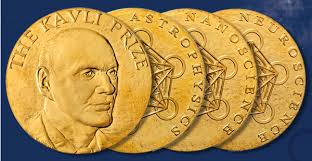Context:
Recently, the 2024 Kavli Prize winners were announced to eight scholars for their contributions in astrophysics, neuroscience, and nanoscience.
More on the News
Winners of
- Astrophysics: David Charbonneau of Harvard University and Sara Seager of the Massachusetts Institute of Technology (MIT) received the astrophysics prize for their groundbreaking work on exoplanet discovery and their atmospheric characterization.
- Nanoscience: Robert Langer of MIT, Armand Paul Alivisatos and Chad Mirkin given the prize for nanoscience.
- Neuroscience: The prize in neuroscience has been awarded to Nancy Kanwisher, Winrich Freiwald, and Doris Tsao.
The trio have been awarded for their collective effort over decades to map the linkage between facial recognition and the brain. - The award ceremony is scheduled for September 3 in the Norway, where recipients will be honoured by the Norwegian Royal Family.
About the Kavli Prize Award
- Fred Kavli (1927-2013), the namesake of the prestigious Kavli Prize, was a Norwegian-American entrepreneur and philanthropist.
- In 2000, he established the Kavli Foundation, with the aim to supports a wide array of fundamental research aimed at improving quality of life for people worldwide.
- It oversees 20 institutes focused on astrophysics, neuroscience, nanoscience, and theoretical physics.
- The inaugural prize was announced in 2008, and awarded to seven scientists.
- The award is given biennially and till date, 73 scientists from 19 countries have been honoured.
- Each Kavli Prize includes a $1 million cash award per field, accompanied by a scroll and a medal.
- The award is administered by the Kavli Foundation in collaboration with the Norwegian Academy of Science and Letters and the Norwegian Ministry of Education and Research.
Comparison to the Nobel Prize
- Kavli envisioned the Kavli Prizes to celebrate groundbreaking achievements in astrophysics, nanoscience, and neuroscience – the largest, smallest, and most complex realms of scientific inquiry.
- Though the Kavli Prize was designed to be like the Nobel in the fields of astrophysics, neuroscience, and nanoscience, it is far-reaching than Nobel.
- Unlike the Nobel Prize, which is restricted to recent discoveries, the Kavli Prize recognizes contributions without such temporal constraints.

